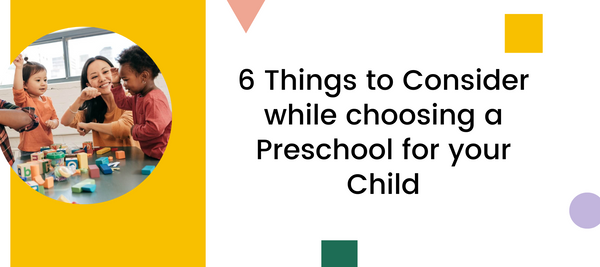6 Things to Consider while choosing a Preschool for your Child
Posted on February 08 2023

Deciding on a preschool that is a good fit for your child and family can be exciting as well as overwhelming, especially when considering higher education. But very few parents realise that your child’s preschool will have more of an effect on their growth and is far more crucial than their later years in school. The preschool years are the building blocks in a child’s life and the most important years for their development. While learning is a continuous process throughout our adult life, it is never at the volume and rate that children learn in the first six years of their life.
How to select a Preschool?
To begin with, you need to narrow down your options by looking at location, style of teaching and fee. Every family is very different, so you can consider these factors based on your priorities and needs. Once you’ve narrowed it down to a few preschools, take some time out and schedule a school tour so you can see the campus first hand and interact with a few faculty members.
Things to consider while choosing a preschool -
1) Proximity

While narrowing down a preschool it is crucial to consider the location of the school. As a parent would you be comfortable with your child travelling long distances and spending hours on the road while going to and fro school, especially the way back is when children are most anxious to get home. Going to preschool away from the comfort of their home, away from their parents is a significant change in a child’s life. Thus, it’s very crucial to ensure that their overall transition is smooth and comfortable. Try and give priority to a school that is close to your house. By choosing a preschool that is at a distance from your house, your little one will get exhausted just from all the travelling and may resist going to school making it more difficult. Look for preschools nearby and enrol in the one that suits you the best.
2) Credibility of the school

The school closest to your house may have the best infrastructure, but that alone isn’t enough. You must delve deeper and check the credibility of the school. Is the school established enough? What is the background of the management running the preschool? How are the students of previous batches fairing? Talk to your peers, ask for reviews and recommendations on peer groups, browse through their website, follow their social media pages to get a fair idea about the school's credibility and what to expect from the school.
3) Teachers and Faculty

Of all the factors on this list, preschool staff is one the most crucial ones! How teachers interact with their students is very important, during a school tour if possible, see real conversations taking place between the teaching staff and the children. This helps you gauge if the staff has a real interest in what the children have to say, as well as a real interest in the kids themselves. It’s very important that you find out if the teachers are adequately qualified to handle little children such as yours since they are going to be responsible for your little one’s well-being and development when at school.
4) Teaching Methodology

While choosing a pre-school it is very crucial that you understand the school teaching methods. Today it is important to look for a discovery-based program, and not one that limits your child’s skills and is only focused on traditional learning methods. While structure is essential, parents should be on the lookout for a preschool that offers opportunities and activities that help them hone and develop other essential life skills too. While some schools follow only traditional play way methods, some Montessori or Waldorf methods and then there are many that follow a curriculum that borrows elements from two or more. So talk to the educators at the preschool and understand what methodology are they going to follow and what kind of activities do they engage your little ones with.
5) School Campus

The environment of the preschool also plays an important role in fostering your child’s learning and development. While the campus need not be massive, it must be hygienic, well lit, child-friendly, and safe. When your child walks into their preschool it should feel like a space that belongs to them. Look out for adequately sized classrooms that showcase the children’s artwork, interesting charts and cut-outs that pique their curiosity and interest.
6) Communication and Transparency

Apart from the quarterly parent teacher meetings, schools nowadays usually maintain an open and transparent channel of communication with the parents. Since parents and the school must be on the same page and collaborate for each child's growth, their communication style and frequency are crucial. While there’s no one “right” way, it’s important to keep the classroom connected to the home for the overall development for your little one.
While choosing a preschool, keep in mind that it is one of the most crucial decisions you will be making for your little one that deserves the best. So take your time and try find out every possible detail about the school that suits you and your little one and trust your process and instincts.
